The Philosopher of Decline
Oswald Spengler stands as one of the most controversial and influential intellectual figures of the early 20th century. Best known for his theories on the cyclical rise and fall of civilizations and his often pessimistic view of Western culture, Spengler’s writings elicited both deep admiration and sharp criticism. His monumental work, The Decline of the West (“Der Untergang des Abendlandes”), published in two volumes between 1918 and 1922, positioned him as a leading thinker in the philosophy of history.
Oswald Spengler was born on May 29, 1880, into a middle-class family in Blankenburg, Germany. As the eldest of four children, Spengler was raised with a strong emphasis on traditional German education. His academic pursuits were wide-ranging, covering mathematics, natural sciences, philosophy, and history, which he studied at various German universities, including Halle, Munich, and Berlin. Spengler’s worldview was heavily shaped by German intellectual giants such as Goethe and Nietzsche, whose reflections on cultural vitality and existential depth influenced him profoundly.
After spending some years as a teacher, Spengler decided to devote himself fully to his writing. He lived a relatively secluded life, avoiding the public eye in favor of intellectual exploration. The devastation and disillusionment caused by World War I profoundly impacted his thinking, motivating him to write The Decline of the West. The first volume was published in 1918, coinciding with the collapse of the German Empire, adding poignancy to the book’s sweeping cultural analysis. Despite gaining prominence in German intellectual circles, Spengler remained cautious of political affiliations, distancing himself from movements like National Socialism even though he shared its critiques of modern liberalism.
The Decline of the West is Spengler’s most important work, in which he presents his theory of cultural morphology, arguing that societies are like living organisms that go through stages of birth, growth, maturity, and inevitable decline. He viewed Western civilization as entering its “winter” phase—a period marked by stagnation and cultural exhaustion. Spengler introduced the concept of “pseudomorphosis” to describe young cultural forms stunted by dominant preceding influences, preventing them from achieving a unique identity. He sought to reinterpret historical development, suggesting that each culture had its unique life cycle, contrary to the Eurocentric notion of linear progression.
Spengler contrasted the “Faustian spirit” of Western civilization with other cultures, such as the “Apollonian” culture of Ancient Greece and the “Magian” culture of the Near East. The West’s Faustian spirit was characterized by an insatiable drive for exploration, expansion, and conquest—traits that fueled both growth and the West’s eventual downfall. The relentless pursuit of knowledge, power, and progress, Spengler argued, would eventually culminate in spiritual exhaustion.
Unlike Enlightenment ideals that envisioned history as a continuing march toward greater progress, Spengler’s cyclical vision portrayed each culture as a distinct entity that flourished and eventually decayed independently. He rejected the belief that human history moved in a straight line toward increasing achievement. His ideas resonated strongly in post-World War I Europe, where disillusionment with the Old World order gave weight to his theories about cultural decline.
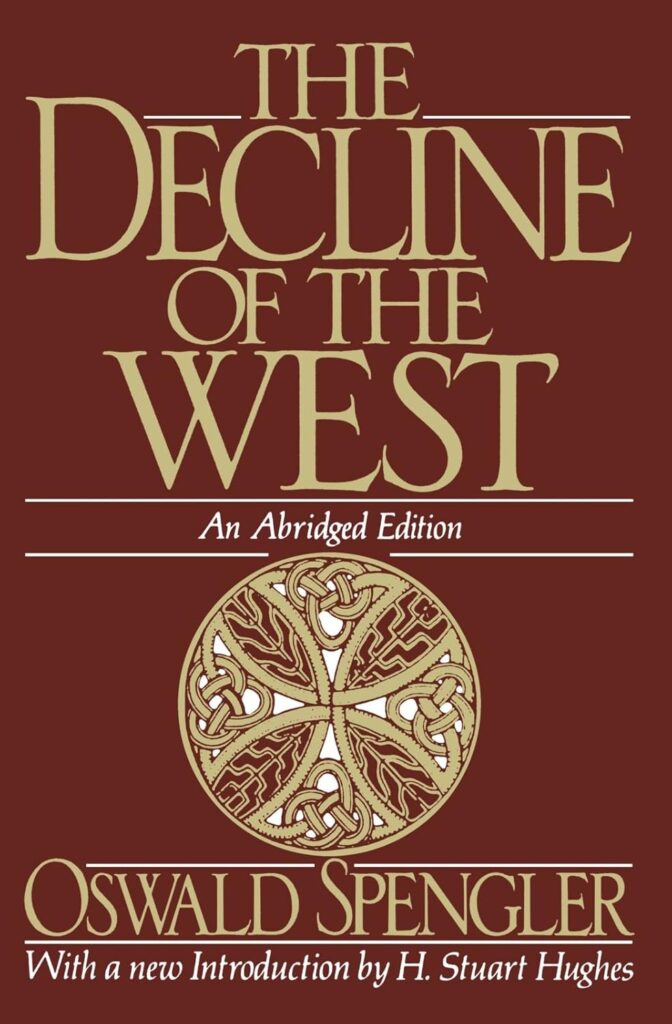
Spengler’s predictions and views offered a dramatic, almost theatrical interpretation of the direction in which Western society was headed. His ability to blend historical analysis with sweeping philosophical speculation gave his work an aura of inevitability and fate. Many readers in post-war Europe, disillusioned by the apparent failure of modern civilization to avert devastating conflicts, were drawn to Spengler’s assertion that decay was inherent in the Western cultural project itself. He became a central figure for those intellectuals who viewed modern liberalism, capitalism, and democracy as signs of cultural decline rather than progress.
The following year, Spengler wrote Prussianism and Socialism, in which he sought to redefine socialism in a way that diverged significantly from Marxist ideology. He believed that socialism was a natural expression of the German character, emerging from Prussian values such as duty, discipline, and the prioritization of the collective over individual interests. In his conception, socialism was not about class struggle but about the organic unity of the national community, emphasizing shared sacrifice and the greater good. This stood in stark contrast to the individualism and capitalism that Spengler associated with “English liberalism.”
Spengler’s concept of “Prussian socialism” celebrated virtues like order, discipline, and communal welfare, which he argued were the antidote to the shortcomings of Western liberal democracy. He was highly critical of parliamentary democracy, perceiving it as incapable of managing the complexities of modern society. Instead, he envisioned a future dominated by charismatic “Caesars”—strong leaders capable of decisive action. While some elements of his philosophy aligned with nationalist currents in Germany, Spengler kept his distance from the Nazi Party, disapproving of their racial doctrines and populist rhetoric. He saw his version of socialism as being more about cultural rejuvenation than about biological determinism.
Spengler’s ideas about socialism were part of his broader critique of modernity. He believed that true socialism, as an extension of Prussian values, could provide the necessary cultural regeneration that would allow Germany to avoid the same cultural decline that plagued other Western nations. This vision of socialism was not tied to economic redistribution or class struggle but was instead a spiritual mission focused on uniting the nation under a shared cultural identity. In this way, Spengler presented a romanticized ideal of national socialism that prioritized cultural strength, unity, and continuity over revolutionary upheaval.
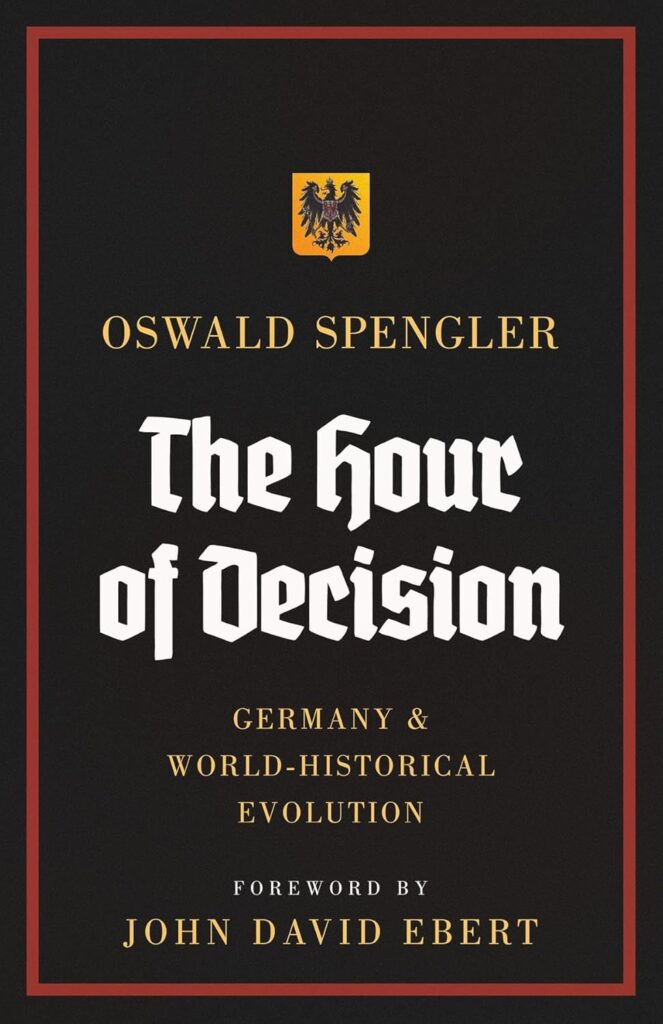
It wasn’t until 1933 that Spengler published his most politically engaged work, The Hour of Decision. Here, he addressed the turbulence of his time, analyzing the cultural, social, and political challenges facing Western civilization. Spengler foresaw the 20th century as an era of existential crisis, in which nations would need to make difficult choices to ensure their survival amidst rising global tensions. He emphasized the decline of traditional elites and the dangers posed by mass politics and simplistic ideological solutions.
Spengler saw the rise of totalitarian regimes as an inevitable consequence of the failure of liberal democracies, which he believed lacked the vigor to address the complexities of modernity. However, he was wary of these new political movements—whether fascist, communist, or liberal—criticizing their rigidity and their inability to solve the underlying spiritual problems of Western society. Instead, Spengler called for a leadership style grounded in cultural authenticity, historical consciousness, and strength.
In Hour of Decision, Spengler also warned of the global challenges that Western civilization would face, including the threat posed by non-Western powers. He predicted a future where Western dominance would be challenged by the rise of other cultures, which he saw as a natural outcome of the cyclical rise and fall of civilizations. This perspective gave his work a foreboding quality, suggesting that Western culture had to adapt and strengthen itself if it hoped to withstand the growing pressures of a changing world. Spengler’s critique of the modern political landscape was not only an indictment of contemporary ideologies but also a call to action for the West to reclaim its lost vitality.
Spengler, alongside figures such as Ernst Jünger, Carl Schmitt, and Arthur Moeller van den Bruck, was part of a “Conservative Revolution” within Germany in the
early 20th century. In his Die Konservative Revolution in Deutschland 1918 bis 1932, the Swiss political philosopher and journalist Armin Mohler describes this revolution as a diverse movement of thinkers who rejected both Marxism and liberal democracy in seeking a radical renewal of German society. Spengler was a central figure in this intellectual movement, which sought to chart a new path for Germany after the collapse of the Kaiser’s Wilhelmine Empire.
Mohler argued that the Conservative Revolution was far from monolithic, comprising several ideological strands, including national revolutionaries, Völkisch groups emphasizing German ethnicity, and Jungkonservativen (Young Conservatives). Spengler’s contribution was unique in that his focus was more philosophical than political. He presented a broad and metaphysical critique of modernity rather than explicitly advocating for any political program. This nuanced critique fits well with the wider Conservative Revolution’s discontent with the Weimar Republic and its quest for a new cultural and political order.
Mohler also helps elucidate Spengler’s ambiguous relationship with National Socialism. While there were parallels between Spengler’s cultural pessimism and Nazi critiques of modernity, Spengler opposed their racial doctrines and simplistic solutions. His concept of “Prussian socialism” was fundamentally at odds with Nazi racial ideology. Spengler was interested in the cultural rebirth of Germany through discipline and communal unity rather than racial purity or populist nationalism. This led to a complex relationship with the Nazi regime, as his ideas were simultaneously appropriated and rejected.
Mohler describes the Conservative Revolution as an intellectual backdrop to the political turbulence of interwar Germany. Spengler’s belief in strong leadership, his criticism of liberal democracy, and his view of inevitable cultural decline were themes that resonated with many conservative thinkers of the time. Although Spengler himself was not directly involved in politics, his works provided intellectual support for those advocating for authoritarian alternatives to the perceived weaknesses of the Weimar system. Unlike more radical elements within the Conservative Revolution, Spengler’s approach was not about immediate political upheaval but rather about the broader historical forces that shaped societies.
When Spengler died in 1936, he left behind a complex and thought-provoking intellectual legacy. His influence extended beyond his own publications, deeply impacting other intellectuals and thinkers who were wrestling with the complexities of Germany’s future. Figures like Ernst Jünger and Carl Schmitt found in Spengler’s works a reflection of their own skepticism towards liberal democracy and a fascination with the rise of authoritarian governance. Jünger, known for his valorization of war as a means of personal and collective transformation, found Spengler’s critique of modern society aligned with his own views on the need for a stronger, more heroic national character.
Schmitt, the prominent legal theorist, also drew from Spengler’s analysis of Western decline. Schmitt’s critique of parliamentary democracy and his support for a powerful, decisive state echoed Spengler’s call for leadership that could transcend the limitations of liberal governance. Spengler’s vision of a post-liberal order, led by strong leaders who embodied the cultural will of their people, resonated deeply with Schmitt’s concept of the “decisionist” leader who derives legitimacy from action rather than legalistic constraints.

Spengler’s works significantly influenced conservative and reactionary thought in 20th-century Germany. His theory of cyclical cultural decline resonated with conservative intellectuals and politicians who were similarly critical of modernity and skeptical of liberal democracy. The idea that cultures inevitably go through periods of growth and decay provided a compelling framework for those disillusioned by the political and social chaos of post-war Europe.
However, Spengler’s work has also faced substantial criticism. Many scholars argue that his deterministic view of history leaves little room for human agency or positive change. His rejection of democratic governance and flirtation with authoritarianism have made him a controversial figure, especially in light of the dominance of liberal democratic political systems in the later 20th and 21st centuries. Despite these criticisms, Spengler’s analysis of Western culture’s spiritual decline has continued to attract those who see the pursuit of technological and economic progress as ultimately hollow.
Mohler’s analysis places Spengler within a broader tradition of German conservative thought, highlighting both his influence and his limitations. Spengler’s deterministic view set him apart from more activist members of the Conservative Revolution, who sought immediate political change. His work, rather, is a reflective exploration of the fate of civilizations, offering a cultural critique that extends beyond immediate political concerns. This broader philosophical approach has ensured that his influence persists not only among conservative thinkers but also among cultural theorists grappling with questions of modernity, identity, and the future of Western civilization.
Spengler’s critique of modernity was not limited solely to the German context but touched upon broader concerns regarding industrial society and its effect on the human spirit. His disdain for the materialism of modern Western culture reflects a wider unease about the consequences of unchecked technological progress, alienation, and the diminishing role of tradition and community in people’s lives. The dehumanizing effects of industrialization, which replace organic cultural expressions with mechanical efficiency, are themes that still resonate today, especially amidst concerns over globalization and the erosion of
local identities.
Moreover, Spengler’s work speaks to the challenges that contemporary societies face in maintaining a balance between innovation and cultural continuity. As technological advancements accelerate and societal change becomes increasingly rapid, Spengler’s warnings about the potential for spiritual exhaustion and cultural collapse serve as a poignant reminder of the cost of progress. His cyclical view of history urges us to think critically about whether the trajectory of our own civilization might be approaching a similar inflection point.
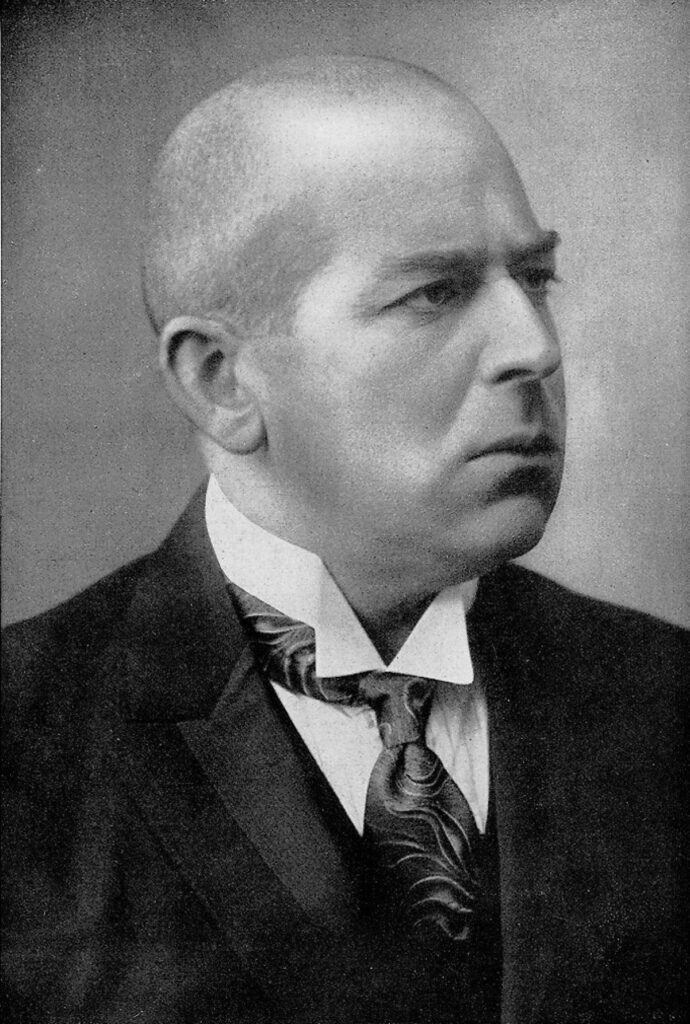
(Wikimedia Commons)
Spengler’s influence on 20th-century intellectuals, including those beyond the conservative sphere, underscores his broader significance. His ideas on cultural decline inspired not only political theorists but also artists, writers, and cultural critics who questioned the sustainability of Western values and the true meaning of progress. His works remain a rich source for those interested in the interplay between history, culture, and power, and provide an enduring framework for interpreting the challenges faced by contemporary Western civilization.
Oswald Spengler’s contributions to the philosophy of history and cultural criticism remain both provocative and influential. His work challenges the optimistic narrative of linear progress and urges readers to confront the vulnerabilities of Western culture. In The Decline of the West, Prussianism and Socialism, and The Hour of Decision, Spengler offers a comprehensive vision of cultural rise and decline that continues to be relevant in understanding the challenges of our time. Though his deterministic outlook can be unsettling, his insights into cultural vitality and decay serve as an important reminder of the forces shaping human history.
By situating Spengler within the broader context of the German Conservative Revolution, as Mohler does, it is evident that his legacy is intertwined with the intellectual currents of his time. Spengler’s work transcends immediate political concerns, providing a unique lens through which to view the decline of cultures and the importance of cultural renewal. His legacy endures as a powerful, if controversial, voice that calls us to look beyond material progress and consider the deeper spiritual and cultural health of our civilization.
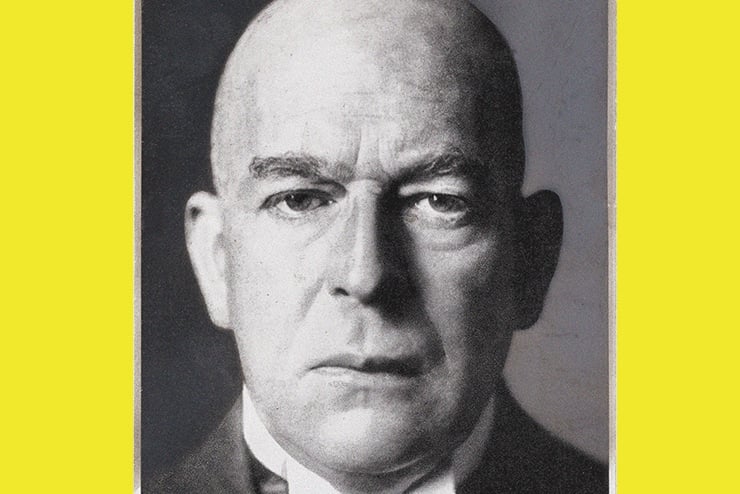
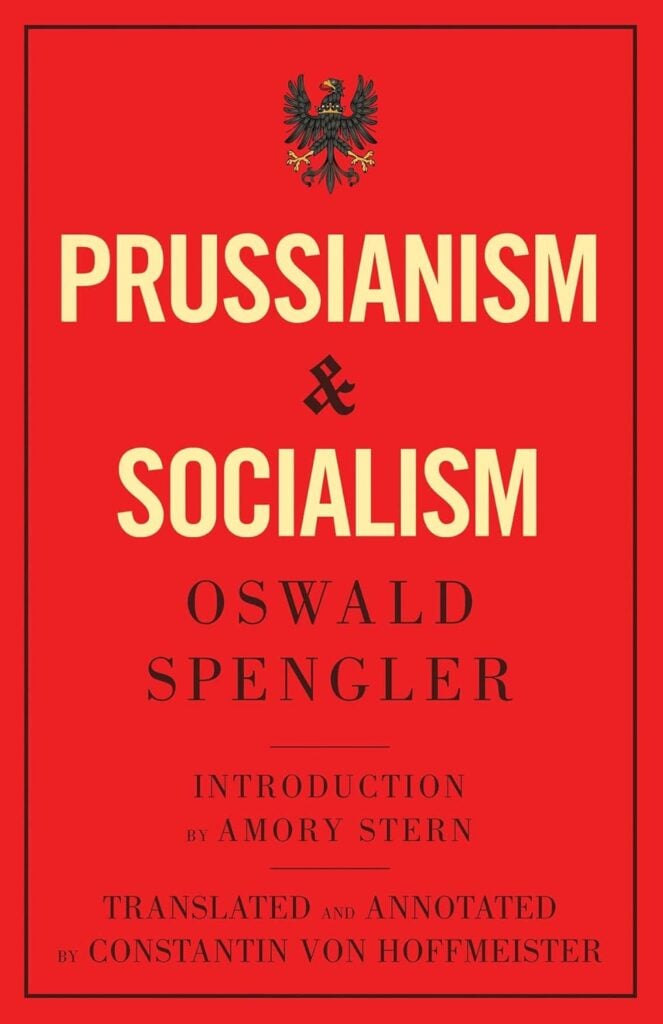
Leave a Reply